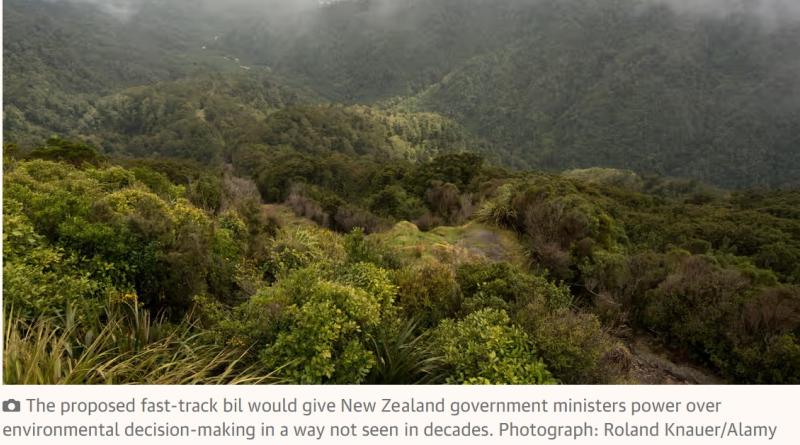New Zealand plans to put big developments before the environment. That’s dangerous

New Zealand’s parliament is considering a law that would allow major development projects to bypass environmental approvals – and that should be a cause for extreme alarm.
The proposed Fast-track Approvals Bill emerged from the coalition agreements that enabled a centre-right government to form after last year’s election.
The bill allows projects deemed of national or regional significance to bypass existing environmental law. A group of three ministers – the ministers of regional development, transport, and infrastructure – will get to decide both which projects meet this “significance” test and whether any given project ultimately should go ahead.
Public submissions to New Zealand’s parliament on the proposed new “fast-track” law to approve major infrastructure and developments closed on Friday. It’s likely that the select committee considering this bill will receive hundreds, if not thousands, of submissions in opposition.
Unfortunately, it’s also likely that the bill eventually will be passed into law irrespective of such voices raised against it. The governing coalition has a comfortable parliamentary majority and has made this bill one of the central planks of its promised economic reform platform. This is unfortunate because both the bill’s processes and potential effects are extremely concerning.
Projects that can be considered under the new law include those that now are not allowed, and may even have been specifically rejected by the courts, for environmental reasons. These include activities that are prohibited because they do not promote sustainable management, as well as activities on public conservation land that will not preserve and protect that land. Activities in parts of internationally recognised world heritage sites can be considered for approval, along with activities that harm endangered species.
Even projects that already have been rejected by the courts for environmental reasons could be fast-tracked. Potential developments previously denied approval are the Te Kuha coalmine on conservation land, the Ruataniwha Dam, and a proposed motorway in Auckland. In expectation of the law’s passage, two deep-sea mining companies have expressed confidence that their projects will receive fast-track approval.
Under the proposed fast-track process, existing requirements for public participation and some appeal rights will be removed. Timeframes for giving and receiving expert advice and recommendations will be truncated. Officials will be required to hurry along when processing applications.
Perhaps most concerning, the ministers deciding whether or not to approve projects must consider first and foremost the objective of providing a process that “facilitates the delivery” of fast-tracked projects. This objective will replace or trump the current principles that guide environmental decision-making for such projects: sustainable management and conservation.
However, ministerial approvals granted under the fast-track law can be used in place of those required under the existing environmental law – and environmental objectives – that would usually apply. This creates a kind of legal fiction, where the decision to allow a project because of its deemed economic and development benefits also is treated as being a decision that it meets the tests of sustainable management and conservation.
This bill will give government ministers power over environmental decision-making in a way not seen since the 1980s. Significantly, none of the ministers who will make these decisions have any statutory responsibility for the environment. One of them, Shane Jones, told parliament that “if there is a mining opportunity and it’s impeded by a blind frog, goodbye, Freddy.”
The decisions these ministers will get to make usually are made by expert, apolitical bodies such as the Environment Court and the Environmental Protection Authority. This is true even under previous instances of fast-tracking, such as legislation introduced in 2020 designed to promote economic and social recovery from the Covid pandemic. It left final decision on fast-track development proposals with an expert panel convened by an Environment Judge.
A further serious constitutional concern is that the proposed law places no duty on the ministers (or others) in relation to the principles of the Treaty of Waitangi. It will be the first New Zealand enactment dealing with environmental matters since 1975 to fail to do so.
The Treaty of Waitangi, which represents a compact between Māori and the Crown, is part of New Zealand’s constitutional foundation. The failure to refer to its principles, thereby freeing decision-makers from having to take these into account when applying the law, is a concerning retreat from progress in government practice over the last forty years.
It is clear that the new coalition government thinks that New Zealand’s existing constraints on “getting things done” are too tight. However, its fast-track approvals bill – ironically introduced into parliament under rules of urgency – is more about getting bad things done in a potentially dangerous way.





